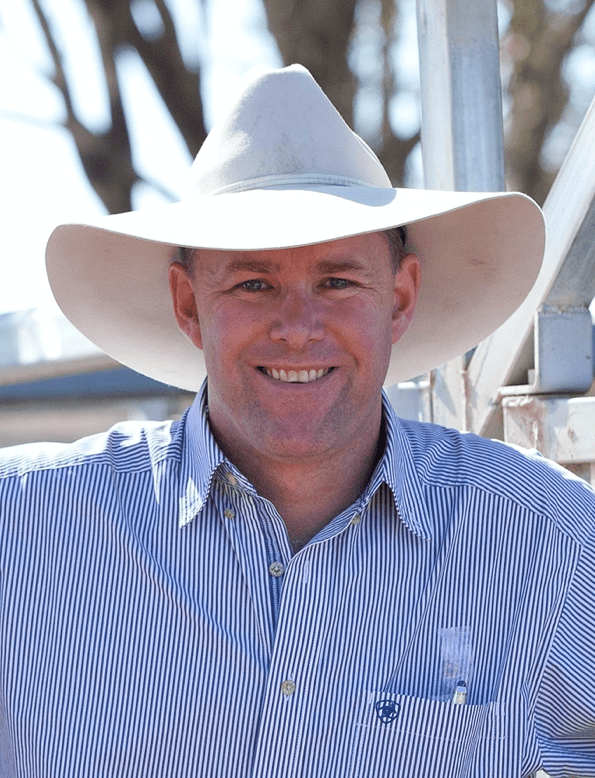
First day crowds at Beef 2024 in Rockhampton in May.
THREE major trends emerged as significant genetic focal points for the Australian beef industry in 2024: sustainability, cost-efficiency, and innovative new technologies.
These areas were widely discussed at national events like Rockhampton’s Beef 2024 and local field days, with extensive information provided to help producers reach goals like carbon neutrality and digital tool integration.
As a result, there are many producers moving towards a refinement of their selection criteria to align with both market and environmental demands. Below are the primary trends we’ve picked up, driving this transformation – along with relevant market data highlighting shifts in demand and pricing for bulls across cattle breeds.
Achieving sustainability and carbon neutrality goals
Sustainability has become a critical driver in cattle genetics, with the industry’s Carbon Neutral 2030 (CN30) target pushing cattle breeders to select traits that reduce environmental impact. Traits such as feed efficiency and methane reduction not only lower emissions but also cut production costs. Julia Waite, CN30 Manager at Meat & Livestock Australia, emphasises that while each producer isn’t required to reach individual carbon neutrality, collective action toward sustainable practices is essential for achieving industry goals. This trend is reflected in the market as producers prioritise cattle breeds that align with these eco-friendly practices.
Focusing on feed efficiency for economic and environmental benefits
Feed efficiency continues to be a top priority among many seedstock producers and commercial producers for both economic and environmental opportunities. Genetic selection based on Net Feed Intake (NFI) helps breeders choose cattle that consume less feed for the same growth, providing direct cost savings. Dr David Johnston of the Animal Genetics and Breeding Unit demonstrated that by selecting a bull with a 1.4 kg daily reduction in feed intake, a typical steer can save 380kg of feed during a feeding period. This efficiency not only enhances profitability but also aligns with sustainability by reducing the resources required per kilogram of beef.
Accelerated genetic progress through artificial breeding technologies
Artificial breeding technologies, such as embryo transfer and in vitro fertilisation, continue to accelerate genetic progress. Companies like Nbryo are making ET and IVF more affordable and accessible, enabling rapid improvements across critical traits. Funded by MLA and the Bill & Melinda Gates Foundation, Nbryo has a stated goal to democratise access to these breeding tools, allowing genetic advancements that once took generations to occur in a fraction of the time. With broader access to artificial breeding, producers can target specific traits more effectively, meeting industry demands for genetic improvement and productivity.
Precision Breeding with Digital Twin Technology
Digital Twin technology, developed by Australian Agricultural Co, enables precision breeding by simulating genetic crosses before implementing them. This tool allows breeders to predict breeding outcomes, balancing traits like polledness and marbling while managing inbreeding risks. By simulating scenarios, Digital Twin empowers breeders to make data-driven decisions that preserve genetic diversity and accelerate progress. Such technologies provide a competitive edge, ensuring producers can optimise herds in alignment with environmental and market objectives.
Welfare-driven selection for polled genetics
Demand for humane practices is leading breeders to prioritise polled (naturally hornless) genetics, reducing the need for dehorning and enhancing safety. Polled genetics align with animal welfare goals and are increasingly favoured by consumers. For breeds with limited genetic diversity, Digital Twin and similar technologies facilitate the integration of polled traits without compromising other production attributes. This commitment to animal welfare through polled selection is reflected in breeds like Santa Gertrudis, which has seen an increase in average price and clearance rates.
Leveraging artificial intelligence for genetic selection
Artificial intelligence (AI) in genetic selection is transforming cattle breeding. AI enables breeders to analyse large datasets for complex traits like disease resistance, fertility, and growth, helping identify optimal genetics faster. Researchers like Prof Ben Hayes from the University of Queensland are advancing AI in genomics, allowing breeders to streamline trait selection and maintain genetic diversity. Although still in early stages, AI’s potential to enhance genetic selection is profound, making it an asset in the quest for sustainable cattle breeding.
Conclusions
The integration of innovative technologies from AI to Digital Twin simulation, could be seen as the start of a reshape for the beef industry. With increasing focus on sustainability, cost-efficiency, and welfare, producers are increasingly making strategic breeding decisions that align with industry goals and consumer preferences.
By prioritising feed efficiency, polled genetics, and traits that support carbon neutrality, breeders are preparing for a future where sustainability and market alignment are paramount.
These genetic advancements, along with supportive market trends, underscore the beef industry’s commitment to responsible and efficient practices. As breeders adopt tools that enhance both productivity and animal welfare, the industry moves closer to a future of sustainable beef production that meets evolving demands while maintaining economic viability. The continued refinement of cattle genetics will empower producers to navigate challenges and opportunities, shaping a resilient and forward-thinking beef industry.
- The practical impact of the genetic advancements outlined above is seen in tonight’s separate article summarising year-over-year sales data for various beef breeds.
Editor’s note: Tonight’s articles mark the close of Beef Central’s Weekly Genetics Review series for 2024. Genetics Editor Al Rayner will be back for the start of the Autumn 2025 bull sales cycle in early February. We thank Al for his thought-provoking and informative contributions on genetics, genomics and bull breeding topics throughout 2024.
 Alastair Rayner is the General Manager of Extension & Operations with Cibo Labs and Principal of RaynerAg. Alastair has over 28 years’ experience advising beef producers & graziers across Australia. He can be contacted here or through his website www.raynerag.com.au
Alastair Rayner is the General Manager of Extension & Operations with Cibo Labs and Principal of RaynerAg. Alastair has over 28 years’ experience advising beef producers & graziers across Australia. He can be contacted here or through his website www.raynerag.com.au

Thank you very much Al. I always enjoy reading your thought provoking commentary. All breeds need to be aiming for the sustainable and achievable outcomes mentioned. We have the tools to get there. Thank you.